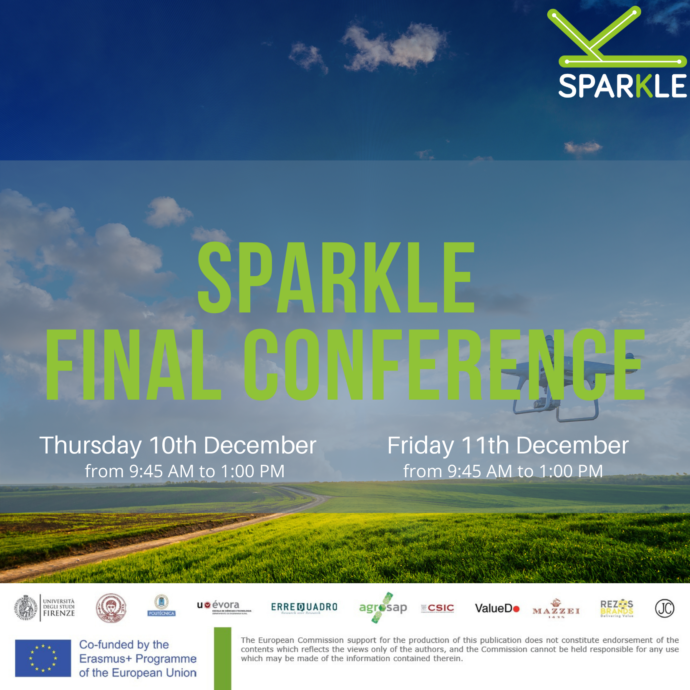Universities, companies and farmers together for digital
Sustainable precision farming – The SPARKLE project
An ERASMUS+ training project on precision farming, high technology and sustainability
SPARKLE Sustainable Precision Agriculture: Research and Knowledge for Learning how to be an agri-Entrepreneur, is a project started in 2018 and will end in December 2020.
The main objective was to develop the first European e-learning platform on precision agriculture to promote the use of technological innovations in the agricultural sector (http://sparkle-project.eu/moodle/).
The course, in English, free and open access, is the result of the close collaboration between the different project partners, coming from the academic, business and agricultural world. The Sparkle course has been built trying to bridge the gap between research, agricultural entrepreneurship, future technicians and farmers (students of Agricultural schools) starting from the analysis of their needs.
The partnership was created thinking about the need to develop a reference model on the application of sustainable precision agriculture for Southern Europe. The partners of the project come from Spain (Polytechnic University of Madrid, Agrosap, CSIC), Portugal (University of Evora, Quinta da Cholda farm), Greece (University of Thessaloniki, Rezos Brands farm) and Italy (University of Florence, Valuedo, Errequadro, Marchesi Mazzei S.p.A); the project financed within the framework of the ERASMUS+ KA2 programme of the European Union had a funding of 800 k€.
The operational proposal of the project has been realised with the introduction of new instruments (for the agricultural sector) such as the use of the Business Model Canvas (BMC) – a well known tool in the start-up and enterprise 4.0 realities – but a real innovation for small and medium farms in the countries involved in SPARKLE. The BMC has proved to be the lever to help the different actors understand where and if the technological innovations introduced can also change the relationships between the various activities that make up a company’s business model. In fact, it is not the technology itself that brings innovation, but the process that activates within the company, in terms of new resources, new skills and new achievable products. Finally, the BMC was used by students who took part in the pilot course to apply for the Business Model Competition. The latter ended with an operational proposal to introduce a new technology in a host farm company and a week of direct on-field experience for the winning students, thanks to the collaboration of the partner farms. Due to the pandemic, the prize was clearly re-adapted according to possibilities. The success of the e-learning platform already achieved in the pilot phase, with 206 students who finished the 25-hour course, meant that the partnership maintained the training approach taken from the beginning for the final version of the course. Hence, 4 main areas (Introduction to Sustainable Precision Agriculture, Technologies, Social and Economic Aspects and Entrepreneurship in Agriculture) divided into 12 lessons made up of 56 topics that deepen the different subjects covered.
The virtual final conference of the project will take place on Thursday, 10th and Friday, 11th December 2020. During the two-day event 4 sessions will follow: Two will be dedicated to technologies, from robotics to projects at European level that work with digital innovation in agriculture, one that links sustainable precision agriculture with educational activities and one focusing more on the figure of the agricultural entrepreneur. Registration for the event is available at this link https://tinyurl.com/y4vfcx6k
CONTACTS
Project coordinator Prof. Marco Vieri – University of Florence DAGRI
For info: info@sparkle-project.eu, www.sparkle-project.eu, http://sparkle-project.eu/moodle/
Social – FB and Twitter: @sparkleerasmus Youtube: Sparkle Project

